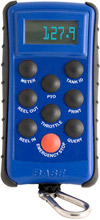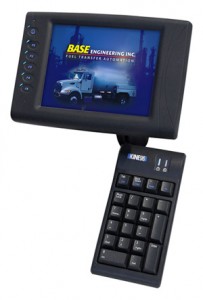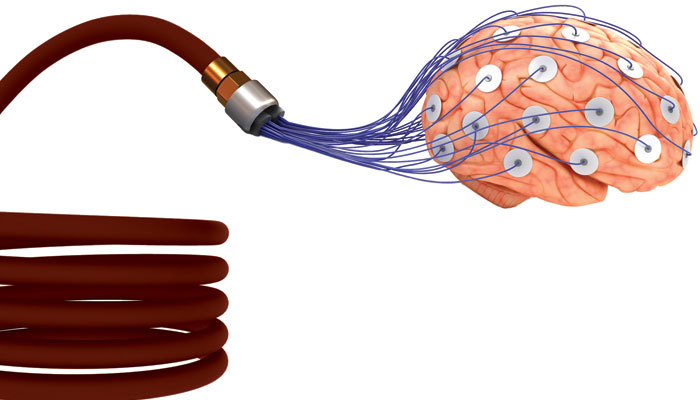 Fuel marketers can make deliveries more efficiently and reduce wear and tear on equipment and drivers with a new on-board computing solution from BASEEngineering.
Fuel marketers can make deliveries more efficiently and reduce wear and tear on equipment and drivers with a new on-board computing solution from BASEEngineering.
Introduced in 2013, the BASEstation is a ruggedized on-board computer that connects to other on-board systems and communicates wirelessly with BASEEngineering’s companion ProControl2 handheld unit that the driver carries at the end of the delivery hose. The handheld can remotely control on-board systems such as the electronic register from up to 300 feet away while also displaying register readings in real time, according to Jason LeVine, BASE Engineering’s Director of Sales for Truck Automation. The handheld also uses RFID (radio frequency identification) technology to identify the customer tank and validate the delivery.
“The benefits come down to enhanced command and control of the payload functionality (remote control of pump, valves and hose reel), along with inventory control (of product delivery), asset control (fuel truck health and usage), safety and driver efficiency,” he explained. “We have also taken a big portion of the data entry done on the truck and narrowed it down to an RFID scan.”
BASE Station
 BASEstation interfaces with the company’s back office accounting system to transfer data, according to LeVine. Account information is loaded into the BASEstation on-board computer so that the data on the truck mirrors the information in the back office system, including prices and tax codes. At the end of the driver’s shift, delivery data is transferred from BASEstation to the back office system via USB stick or WiFi link.
BASEstation interfaces with the company’s back office accounting system to transfer data, according to LeVine. Account information is loaded into the BASEstation on-board computer so that the data on the truck mirrors the information in the back office system, including prices and tax codes. At the end of the driver’s shift, delivery data is transferred from BASEstation to the back office system via USB stick or WiFi link.
The BASEstation carries proprietary software that “massages” the data it collects so that office data can be sent to the truck and truck data can be sent to the accounting software, according to LeVine. “Choosing a new truck system is stressful to our customers because there is worry that it will affect their accounting practices, especially issues with getting the truck tickets into their back-office,” LeVine said. “It is historically a painful transition. BASE aims to ease that pain.”
A company that uses BASEstation will mark each of its customer tanks with a small tag that contains an RFID identifier. The ProControl2 reads the RFID tag to learn the tank’s identity and the type of fuel the tank holds.
Rigid and Flexible
BASEstation offers delivery companies “rigidity and flexibility” in controlling fuel deliveries, according to LeVine. “It seems like a contradiction, but it is genius,” he said. The rigidity refers to built-in logic in the system that is designed to prevent mis-deliveries and product contamination. Every tank compartment on the delivery truck is identified in the system by what product it holds, and every RFID tag indicates the product contained in that customer tank. When the ProControl2 scans the RFID tag, it reads the encoded RFID data and determines whether the products in the hose and the customer tank match. If there is a match, the driver gets a “valid” readout and the driver can begin pumping. If they don’t match, the driver cannot pump fuel. “Once the system is programmed, it will only dispense fuel that is allowed into that tank,” he added.
The system is also flexible enough to allow the driver to adjust the setting after a visit to a bulk plant or terminal. If they fill a compartment with different products, they can indicate the change in the BASEstation system.
BASE Engineering can also customize a company’s ProControl2 handheld units to their specifications and include features such as emergency stop, turning the power take-off (PTO) on or off, throttling up or down, or controlling the hose reel. “BASE has decades of experience interfacing with the payload control of fuel trucks,” LeVine explained. “That puts us on the leading edge of wireless safety and control technologies. It is natural to embed BASEstation in the middle of our wireless systems as the brain of a ‘smarter’ truck.”
Better Delivery Performance
BASEstation can improve delivery operations in a number of ways, according to LeVine. For one, the driver can focus on delivering fuel and not have to worry about recording any data, because BASEstation records the data directly from the register, and the RFID tag confirms the account identity with the customer database stored on the on-board computer.
The driver interacts with BASEstation by logging into either “General Delivery” or “Fleet Fueling”. “General delivery” is used for residential or commercial stops, where one customer is being billed for delivery into a single tank or asset, and it is billed on a single distinct truck ticket. The driver can choose the customer and asset from the touchscreen on BASEstation or use the ProControl2 to scan an RFID tag attached to the asset.
“Fleet fueling” is used for a fueling situation where the driver arrives at a location requiring multiple assets or vehicles to be filled during a single stop. “This situation is a case study for sheer efficiency of BASEstation,” LeVine explained. “We empower the operator to do the job without delays and distractions by freeing them to deliver product and not worry about sorting out the details of the delivery. The BASEstation will sort out the different customers and equipment found on site. The operator does not have to stop and change tickets when different customers are encountered.”
Drivers are also subjected to less physical stress, because they can activate the hose reel control and avoid the chore of lugging the extended hose all the way back to the truck. The system also provides readout data to the ProControl2 handheld, so the driver can essentially read the register remotely and control its operation.
Less Wear and Tear
BASEstation, when used along with the ProControl2 handheld and other BASE systems, saves wear and tear on the truck equipment, particularly the cargo pump, which can be switched on and off remotely to minimize dry running and reduce stress on the pump, Levine said.
The RFID tags that BASEstation uses hold up well to weather and won’t be damaged if they come in contact with fuel or harsh weather. BASE Engineering chose to use them instead of bar codes because of their durability, according to LeVine.
Although the BASE Engineering components handle and store a company’s customer data, BASE is not in the back office software business. Instead, they work closely with companies in the fuel management and back office business to ensure that the on-board system communicates effectively with the back office software. “Our motto is ‘We speak truck,’ and that is where our expertise is,” said LeVine. The company got its start in aviation refueling and now develops wireless products for refined fuel, propane and crane trucks.


